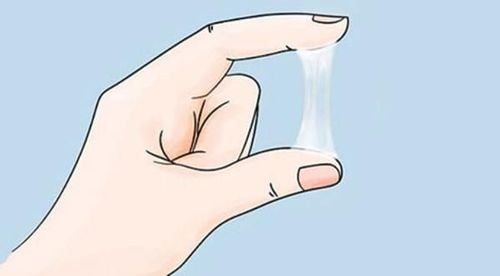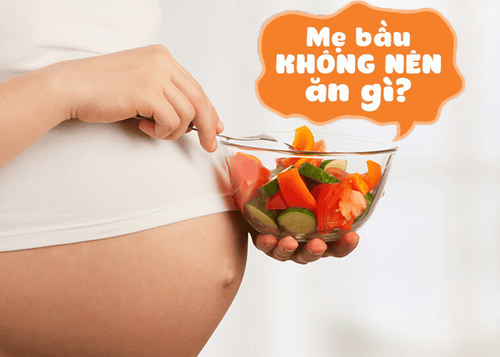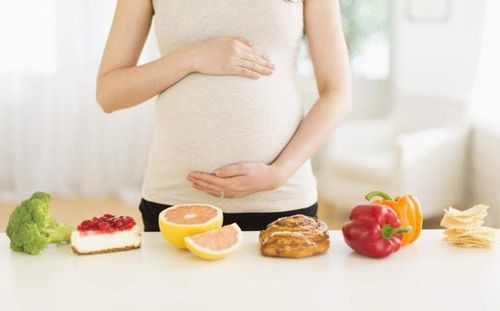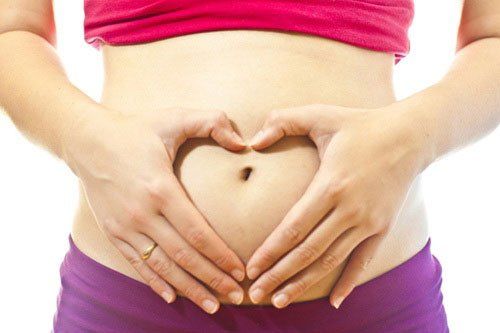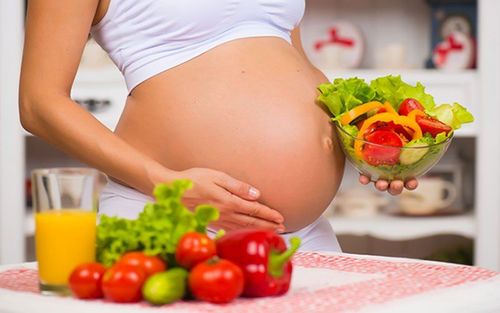This is an automatically translated article.
The article is professionally consulted by Master, Doctor Nguyen Van Thanh - Obstetrician and Gynecologist - Department of Obstetrics and Gynecology - Vinmec Nha Trang International General HospitalNutrition for pregnant mothers during pregnancy is one of the factors that determine the mother's health and the comprehensive development of the fetus right from the womb. Recognizing the foods that should and should not be eaten during pregnancy is something that expectant mothers need to know to apply to their nutrition.
1. 5 food groups
Group of starches and cereals, including: Bread, noodles, rice, oats, cereals, etc. Fruit group: Including fresh fruit, canned fruit, frozen, dried fruit, 100% fruit juice. Vegetable group: Raw vegetables, cooked vegetables, frozen vegetables, canned, vegetable juice 100% Protein rich foods: Meats, eggs, seafood, legumes, beans or soy products, beans peanuts, nuts. Milk and dairy products: Like milk, cheese, yogurt, ice cream.
2. Grease - good or bad?
Although not classified as a separate food group, oils and fats are important nutrients for a pregnant woman's body, providing energy and contributing to the construction of organs and cells of the fetus. , as well as feeding the placenta. Limit solid fats like animal fats or processed foods. Instead, the majority of fat intake should be from plants.
3. Importance of vitamins and minerals
Vitamins and minerals play an important role in all the functions of the human body. During pregnancy, a woman's body will need more folic acid and iron than usual.
4. How to get more vitamins and minerals during pregnancy?
Vitamins can be obtained from vitamin pills for pregnant women, combined with a diet menu that provides enough other vitamins and minerals needed for pregnancy.
5. What is folic acid, how much folic acid is needed daily?
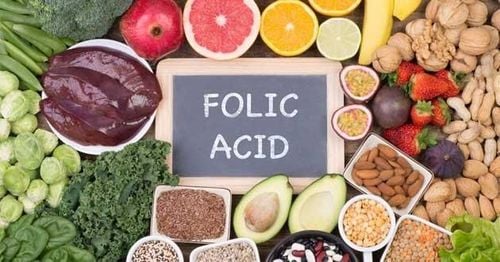
6. Importance of iron in pregnancy, the amount of iron needed each day
Iron is an essential element to make hemoglobin, the substance that gives red blood cells its red color and is responsible for carrying oxygen to organs and cells in the body. Pregnant women need about 2 times more iron than other women. This amount of iron helps the body produce more blood to deliver oxygen to the fetus. Pregnant women are advised to take iron tablets daily, dose of 27 mg. In addition, should eat foods rich in iron such as lean red meat, chicken, duck, fish, dried beans, iron fortified cereals, prune juice. To absorb iron more easily, combine with foods rich in vitamin C such as oranges, tangerines, tomatoes.7. The importance of calcium in pregnancy, the amount of calcium needed each day
Calcium builds bones and teeth for babies. All women 19 years of age and older, including pregnant women, should get 1000 mg of calcium per day; Girls aged 14-18 should get 1300 mg daily. Milk and dairy products, such as cheese and yogurt, are the best sources of calcium. If the body has difficulty digesting milk and dairy products, you can get calcium from other foods such as cauliflower, dark green leafy vegetables, sardines, or take calcium supplements.
8. Importance of vitamin D in pregnancy, the amount of vitamin D needed each day
Along with calcium, vitamin D contributes to the development of baby's bones and teeth, and is also an essential element for healthy skin and vision. All women, including pregnant women, need 600 units of vitamin D per day. Vitamin D can be obtained from vitamin D-fortified milk and fatty fish such as salmon. Sunbathing is also a method of recharging vitamins for the body.
9. During pregnancy, about how much weight should a woman gain?
The amount of weight to gain depends on your health as well as your body mass index (BMI) before pregnancy. For women with a normal weight before pregnancy, it is recommended to gain about 11 to 15 kg during pregnancy. Women who were underweight before pregnancy should gain more weight than the average person and vice versa.

10. Is being overweight or obese affecting pregnancy?
Overweight and obesity increase the risk of some diseases during pregnancy such as gestational diabetes, high blood pressure, pre-eclampsia, premature birth, cesarean section. It also increases health risks to the baby such as birth defects, a larger-than-normal fetus (potentially causing birth trauma, or childhood obesity).
11. Does caffeine affect pregnancy?
There are many studies on the topic that caffeine increases the risk of miscarriage, however, there are no results that clearly support this point. Most experts agree that there is no problem with consuming less than 200 mg of caffeine per day during pregnancy (equivalent to about 350 ml of coffee).
12. Fish and shellfish are beneficial for pregnancy
Omega-3 fatty acids, an important contributor to fetal and infant brain development, are found in many types of fish. Women should eat between 220 grams and 340 grams per week before, during pregnancy, and while breastfeeding.
13. Types of fish to avoid or limit
Mercury has been linked to birth defects in young children. Because some fish contain more mercury than others, care should be taken in choosing fish and crustaceans such as shrimp, salmon, and catfish. Avoid eating honeyfish, swordfish, mackerel, etc. Limit longfin tuna (about 170 grams/week).
14. Effects of food poisoning on pregnancy
Food poisoning in pregnant women can cause serious problems for both mother and baby. Vomiting and diarrhea cause dehydration and throw the body off balance. Some notes to prevent food poisoning:
Wash food. Wash raw foods carefully under running water before eating, preparing or preparing them. Keep the kitchen area clean. Wash hands and kitchen utensils such as knives, cutting boards, etc. thoroughly after use. Avoid eating undercooked seafood, eggs, and meat. Do not eat raw fish sushi. Need to cook all kinds of beef, pork, chicken, duck, etc.
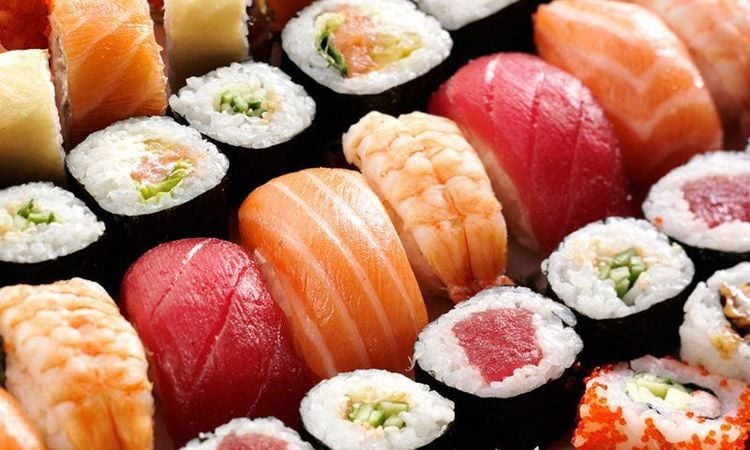
15. What is listeriosis (a disease caused by a listeria infection)? How does it affect pregnancy?
Listeriosis is a dangerous infectious disease caused by eating food contaminated with bacteria called Listeria monocytogenes. Pregnant women are 13 times more likely to get the disease than the general population. Symptoms are usually mild, flu-like, with fever, muscle aches, diarrhea, or even no symptoms at all. This disease can lead to miscarriage, stillbirth, premature birth. When you're sick, your doctor will likely prescribe antibiotics to treat the infection and protect your baby. To prevent illness, the following foods should be avoided during pregnancy:Unpasteurized milk or foods made from unpasteurized milk. Sausages, canned meats, cold cuts. Can be eaten if processed. Frozen pate Frozen smoked seafood Seafood, eggs, raw or undercooked meat.
Please dial HOTLINE for more information or register for an appointment HERE. Download MyVinmec app to make appointments faster and to manage your bookings easily.
Articles refer to Acog.org source





